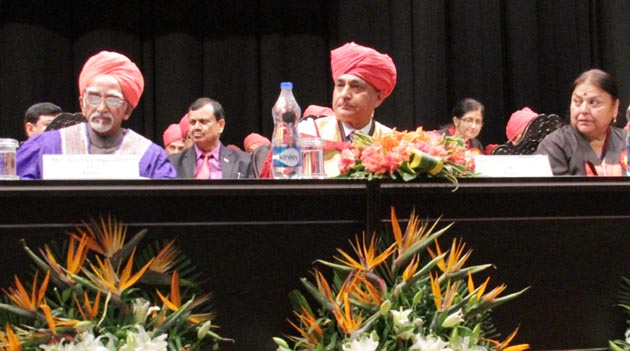JAMMU: The Vice President, Shri M. Hamid Ansari has underlined the centrality of the judiciary in securing the Constitutional rights of citizens. He was addressing the 16th Convocation of University of Jammu, in Jammu today, which was attended by the Governor of Jammu & Kashmir, Shri N.N. Vohra, the Chief Justice of India, Justice T.S. Thakur, the Vice Chancellor of University of Jammu, Prof. R.D. Sharma, other Dignitaries, Faculty Members and Students.
The Vice President said that people increasingly turn to the judiciary for solving social problems due to its accessibility, affordability and confidence that justice will be dispensed speedily. He further said that any discussion of the constitutional ideal of India being a ‘secular’ republic having a ‘composite culture’ has to be premised on the existential reality of the society which is characterised by heterogeneity.
The Vice President questioned how the Indian State, in principle and practice, has given shape to the essential ingredients of the secular principle and composite culture. Apart from the principles enshrined in the constitutional text, the policy pronouncements of public figures, often nuanced to suit the occasion and judicial pronouncements shed useful light on the matter, he added.
Quoting eminent jurists, the Vice President said, that unless the Court strives in every possible way to assure that the Constitution, the law, applies fairly to all citizens, the Court cannot be said to have fulfilled its custodial responsibility. The Vice President added that Indian secularism has been described as ameliorative whose spiritual core is incrementalism and that a citizen could well hope that this incremental approach is used to enhance social cohesion and social peace.
Following is the text of the Vice President’s address:
“This is indeed a special occasion. The university is honouring one the most eminent sons of the State of Jammu & Kashmir whose achievement is but a rarity and worthy of celebration. After all, it is only the chosen few in the calling of law who climb the ladder to the very top in the highest court of the Republic to join the galaxy of men who have presided over the Supreme Court of India.
Our founding fathers gave us a Constitution that encapsulates in its text the ideals and values of People of India. The first among these is Justice and, as John Rawls put it, ‘rights secured by justice are not subject to political bargaining or to the calculus of social interests.’ To ensure this, Article 32 of the Constitution gives us the right to move the Supreme Court which has the power to take corrective measures for the enforcement of these rights. A similar power is conferred, within their area of competence, on the High Courts, under Article 226.
From this emanates the centrality of the judiciary in securing for citizens the rights bestowed by the Constitution. In our own times, as an eminent judge elsewhere noted some years back, ‘people increasingly turn to the judiciary hoping it can solve pressing social problems.’
An essential concomitant of this is accessibility of the judiciary; another is affordability; a third is the confidence that justice will be dispensed speedily. The latter is contingent not only on the technicalities of the law but also on the unstated major premise underlying the thought process. It is said that the judiciary is above but not beyond the issues of the day. ‘We may try,’ said the American judge Cardozo, ‘to see things as objectively as we please; none the less, we can never see them with any eyes except our own.’ And yet, he continued, ‘the training of the judge, if coupled with what is styled the judicial temperament, will help to broaden the group to which his subconscious loyalties are due.’ Hence arises the need ‘of constant checking and testing of philosophy by justice and of justice by philosophy.’ To this may be added Lord Bingham’s caution about the need for judges to ‘neutralize any extraneous considerations which might bias their judgement,’ or else decline to make the decision in question.


